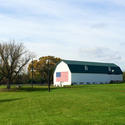As its economy bounced back from the Great Recession, California emerged as a progressive role model, with New York Times columnist Paul Krugman arguing that the state’s “success” was proof of the superiority of a high tax, high regulation economy. read more »
Policy
High-Flying California Charts Its Own Path -- Is A Cliff Ahead?
- Login to post comments
Is Anybody Really Listening: Pizza with Perez in Youngstown
Ohio has long been seen as a battleground state, up for grabs in most Presidential elections. The state supported winning candidates of both parties for decades. But as the state shifted back and forth, the Mahoning Valley (Mahoning and Trumbull Counties) in Northeastern Ohio remained a Democratic stronghold. If Democratic candidates could garner more than 62% of the vote in this region – as they often did -- they would win the state. In years when Republicans won, the Mahoning Valley still voted for the Democrats, but with less enthusiasm. read more »
- Login to post comments
Is California Anti-Family?
In its race against rapidly aging Europe and East Asia, America’s relatively vibrant nurseries have provided some welcome demographic dynamism. Yet, in recent years, notably since the Great Recession and the weak recovery that followed, America’s birthrate has continued to drop, and is now at a record low. read more »
- Login to post comments
Meet Marble
I’ve lived in this neighborhood for so long that I’ve grown used to tech start ups beta testing their schemes on my doorstep. I remember the first time I saw a car drive by with a huge furry pink mustache strapped to the front grill between the headlights. That was the start of Lyft. I have a clear memory from 2008 when a friend rented her apartment out on a new internet platform. That was Airbnb. Back in the late 1990s during the dot com bubble there was a start up that would deliver everything from milk to condoms via bicycle courier. read more »
- Login to post comments
California’s Global Warming High-Speed Train
The California High-Speed Rail Authority promises to “achieve net zero greenhouse gas (GHG) emissions in construction” and is committed to operate the system on “100% renewable energy” by contracting for “400 to 600 megawatts of renewable power”. These promises may please environmentalists, but they cannot be kept. read more »
- Login to post comments
The Grenfell High-Rise Fire: A Litany of Failures?
At this writing, the London (Kensington) Grenfell high-rise fire has taken a confirmed 58 lives, with an unknown number missing and many more sent to hospitals. The 24 story low income housing tower block caught fire on Wednesday, June 14. It was virtually all consumed, as shown in the photograph above. read more »
- Login to post comments
Connecticut's Future is Suburban, Not Urban
Connecticut is now grappling with a fiscal and economic crisis that, according to some leading Democrats, has been caused by ineffective urban policy. In late May, Hartford-based insurer Aetna confirmed long-discussed rumors that it will be moving its headquarters from Connecticut. General Electric announced plans to move from Fairfield, Connecticut to Boston in January 2016. read more »
California’s Descent to Socialism
California is widely celebrated as the fount of technical, cultural and political innovation. Now we seem primed to outdo even ourselves, creating a new kind of socialism that, in the end, more resembles feudalism than social democracy. read more »
- Login to post comments
Is Your Transportation Project a Boondoggle?
Tony Dutzik, writing for the progressive Frontier Group, offers a ten ways of recognizing whether a highway project is a boondoggle. A few of his ideas are valid: a highway widening project aimed simply at creating a continuous four-lane road even when there is no demand for four lanes seems silly. read more »
The Great Betrayal of Middle America
America’s vast midsection, a region that has been hammered by globalists of both parties, has been abandoned by the great corporations that grew fat on its labor and resources.
To many from the Appalachians to the Rockies, Donald Trump projected a beacon of hope. Despite the conventional wisdom among the well-heeled of the great coastal cities, these resource and manufacturing hubs elected the new president. read more »





















